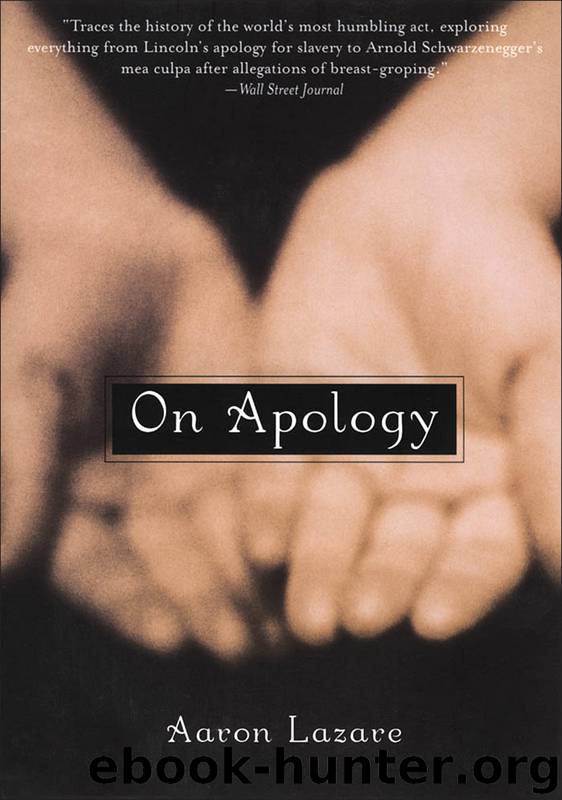On Apology by Lazare Aaron;

Author:Lazare, Aaron;
Language: eng
Format: epub
Publisher: Oxford University Press, USA
Published: 2004-04-13T04:00:00+00:00
BOTH CATEGORIES OF MOTIVES FOR APOLOGIES HAVE THEIR PLACE IN THE WORLD OF RECONCILIATION
Having examined two sets of apologies spurred by internal and external motivation, respectively, can we assess the value of these two types of motives for apologies? If we think of times when we have been offended by someone we cared about, we may want to believe that they were motivated by an empathic concern for us, and their feeling of guilt or shame because they offended a good friend. We might even expect them to treat strangers in a similar fashion, because we admire people of character who are committed to fairness and to preserving the dignity of others. We trust them as individuals. We can count on them. They are reliable. They are sincere. These are the kind of people who would return your lost wallet, even if they did not know you, because they know how they would feel if they lost their wallet (empathy) or because it is simply the right thing to do (a healthy sense of guilt). Does our admiration for these people suggest that apologies motivated by a desire to avoid punishment or to restore peace between nations, groups, families, and individuals have less value?
I believe that these “strategic” apologies—motivated by the offenders’ attempt to change how others perceive them or keep their relationships intact or enhance their social stature—are valuable even if the offenders do not exhibit or experience shame, guilt, and empathy. How can we argue against social harmony among individuals, families, and nations? How can we argue against the avoidance of war? As we saw in chapter 3, in order to be successful, an apology must meet the needs of the offended party, such as the restoration of dignity, acknowledgment of shared values, reparations, and the like. To believe that a “pragmatic” apology is somehow less truthful or less effective than a more impassioned one is to value style over substance, as if we believe that the manner in which an apology is delivered is more important than the goals it seeks to achieve. I believe such an attitude shortchanges both the personal and social value of the apology process. As long as an apology meets important psychological needs of the offended, or, by being public, it reestablishes harmony and reaffirms important social values, we should not diminish its effectiveness by becoming critics. We can also learn from Japanese and Chinese cultures that reestablishing social harmony is often the major function of apologies.
Download
This site does not store any files on its server. We only index and link to content provided by other sites. Please contact the content providers to delete copyright contents if any and email us, we'll remove relevant links or contents immediately.
| Anthropology | Archaeology |
| Philosophy | Politics & Government |
| Social Sciences | Sociology |
| Women's Studies |
The Secret History by Donna Tartt(19023)
The Social Justice Warrior Handbook by Lisa De Pasquale(12182)
Thirteen Reasons Why by Jay Asher(8882)
This Is How You Lose Her by Junot Diaz(6869)
Weapons of Math Destruction by Cathy O'Neil(6260)
Zero to One by Peter Thiel(5782)
Beartown by Fredrik Backman(5729)
The Myth of the Strong Leader by Archie Brown(5491)
The Fire Next Time by James Baldwin(5421)
How Democracies Die by Steven Levitsky & Daniel Ziblatt(5209)
Promise Me, Dad by Joe Biden(5139)
Stone's Rules by Roger Stone(5078)
A Higher Loyalty: Truth, Lies, and Leadership by James Comey(4945)
100 Deadly Skills by Clint Emerson(4910)
Rise and Kill First by Ronen Bergman(4772)
Secrecy World by Jake Bernstein(4736)
The David Icke Guide to the Global Conspiracy (and how to end it) by David Icke(4696)
The Farm by Tom Rob Smith(4500)
The Doomsday Machine by Daniel Ellsberg(4480)
